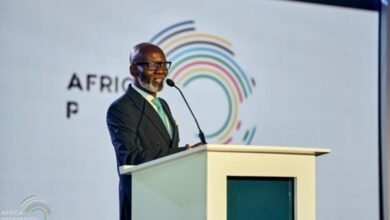What happens to Konza city, destined to become the future African Sillicon Valley? The Kenyan smart city has already launched the activities of its flagship project, Konza Technopolis, designed to promote STEM in the country. Its director Josephine Ndambuki tells more.
Interview by Dounia Ben Mohamed
Introduce us to the Konza Technopolis project and how it contributes to the promotion of STEM in Kenya?
The project was launched about ten years ago by the government as a strategic investment that would propel the country towards a knowledge-based economy.
You know that Kenya has already made some inroads, particularly in the technology sector, with innovations such as M-pesa, that have really propelled the country’s position in the global innovation space.
But again, realizing that the world is moving to a knowledge economy, we understood that there was a need to invest in developing a smart city that will become the heart of East Africa and probably the African region in terms of development and technological advancements.
This is the principle of Konza.
Our vision is to develop a world-class technology hub and innovation center.
We want to create a space where the innovation ecosystem is thriving and where we contribute to Kenya’s knowledge economy.
To achieve this, we are proceeding in two phases. We are developing a new city. This means that we are building a city from ground up, which has taken a lot of investment and time.
We started with the Foundation, the horizontal infrastructure, the city under the city and the complex systems needed to lay the foundations of the smartness of the city.
For example, we have utility tunnels, water retention facilities, ICT facilities, and waste management systems already in place.
Therefore, the heart of this project is the knowledge economy and innovation. And this is where we bring the technological aspects to activate the dynamism of the city, technological innovations, tech companies, science and research, universities, industries coming together to work on development and dynamic innovation where research is undertaken, commercialization of research is done.
Startups are supported all the way to enable them to grow, in addition to skills development, because we believe that one of our strategic areas is to become a talent hub where, people can, through digital transformation, work from Kenya for any company, in any part of the world.
Therefore, we really want to create a base of qualified and very talented professionals who can seize the opportunities of the digital space, with the support of Konza, and work all over the world.
So those are the two areas that we’re focusing on as the city develops in a literal sense, with buildings in operation.
But also, the heartbeat is this ecosystem of innovators, researchers, scientists, ICT professionals who are working, supported by Konza, but really just taking up opportunities as they present themselves in Kenya, in the East African region and in the world.
And if you want to catalyze a community of skilled professionals, then you have to ask yourself how to influence the pipeline from the academia side, and as this skill set advanced all the way to professionals, and they’re turned out of the market with two pathways, either they are professionals working for others, or tech entrepreneurs, establishing their businesses and running their businesses successfully.
At Konza, we can talk about four initiatives. And the first one is an infrastructure. So we have put in place at the National Data Center. Now our National data Center is tier three, and it is active and running.
It supports clients and enterprises to be able to leverage the cloud-based solutions at our data center for full scale.
That means we are coming into support our industries to go digital and we appreciate the place of digital in really taking businesses to a global platform.
And we are supporting this both for the government digital agenda, as well as for our citizens, our private sector, investors in our setups.
We are, of course, providing this service at commercial rates. And we’re also working with innovators who need cloud-based solutions, to connect to our data center and to be able to go.
And as this is just a part of the initiatives we are doing to mentor and support these enterprises to be able to scale.
So, so far we have two data centers at Konza technopolis up and running and we are building a disaster recovery site off site so that then we can be able to provide resiliency of the data that we are hosting, and as we scale the businesses, in collaboration with other operators in the country and also beyond our borders.
One of the projects at the heart of Konza Technopolis is the Kenya Advanced Institute of Science and Technology (KAIST) set up in partnership with the Koreans…
The second part is what we call our knowledge-how the university.
We are, therefore, building a science technology and innovation-focused postgraduate University of research and with a focus that research will be done in this center.
It will provide a space for commercialization.
Our university is called Kenya Advanced Institute of Science and Technology (KAIST). It is modeled alongside the Korea Advanced Institute of Science and Technology.
And this actually becomes our knowledge hub, with research facilities for a compliment, also very experienced professionals that come from the faculty and ideally would be able to draw its students from Kenya and even beyond the country for really focused research that is contextual to our environment with an intention to commercialize it in deploying new solutions from Konza.
So, we are excited that the university has grown and the project is currently ongoing, and we can’t wait to admit our first students.
We are currently working in partnership with the Ministry of Education, to establish the curriculum.
And of course, leveraging digital, we see that training will start before the physical infrastructure is done, just so that then the momentum can kick.
And you as you may know that the Korea advanced Institute of Science and Technology has played a big role in commercialization of innovation and research in Korea.
And brands such as Samsung have originated from that.
And so, we are really excited that we are working in close partnership with that university as a sister university to our Kenya, KAIST.
Now, the other thing that we are doing is a program around innovation support, and innovation and skills development.
So, under our knowledge economy innovation pillar, we have a program we are calling the Konza innovation ecosystem initiative.
Now, under this initiative, we have been working in partnership with the country’s ecosystem of academia, industry development organization and the citizens to support them to be able to advance in two ways: skills development, where we are doing ICT training for different community groups and working with other ministry agencies to inform policy and to provide a good environment for growth.
So, we are currently working very hard in terms of just providing the basic skill sets that we believe are needed for future residents of Konza.
Because here we are developing this very smart city, highly tech enabled with huge prospects for tech.
And we believe that the citizens who will be taking advantage of this should be well versed with technology skills.
So, we work in partnership with innovation hubs in the country, with Ministry of Education, with Ministry of ICT to advance ICT skills training in different capacities.
For example, right now we’re running a program on blogging and web development.
And again, this program targets, in particular, girls, because we think of the digital divide, we don’t want to have a digital gender divide.
So, we have some initiatives that are targeted specifically for certain groups to enable them to acquire skills.
We’ve built partnerships with universities. We are also reaching out to the KG 1 to 12, which is the basic education level, to provide opportunities for digital literacy at schools.
And, of course, plugging into the wider government initiatives, such as the computer literacy programs that are run by our ministry of education.
Now, in terms of advancing that skill set, again, we have clouds where we are working with our ICT authority to really ensure that we are having not just everybody to come to Konza, but we go out to the academia through the innovator hubs in the country, to deliver programs that we believe are key.
We are now starting to see some outputs; we have some very prospective or successful enterprises that are scaling thanks to the work that we are doing at the techonpolis.
Besides programming, we see ourselves as playing in the policy, environment and supporting requisite policy to ensure that the environment then provides support for skills, such as the ICT, because we believe that we can do programs, but we can influence at a larger scale, if we set the tone right.
And one of the activities that we’ve worked very hard to support is the startup bill that promises to put in place incentives to promote local startups to be able to find the support they need to scale their businesses.
Overall, this program is in line with the policy of digital promotion conducted by Kenya for several years now…
Our project is under the umbrella of the Ministry of ICT, and what we call the Ajira program which aims to develop skills around the digital workspace.
So, it’s a program aimed at developing digital skills and also an opportunity to work by leveraging digital skills.
This program has expanded beyond the capital city to other parts of the country.
Of course, we have digital skills training in schools, where students are now getting computer training as part of the curriculum.
And you may know that we also have a new transition in our education sector from the former aid for food to the new competency-based curriculum. I think it will be a good discussion to have within Ministry of ICT, and how that really brings out the elements of applied learning, even for a very tender age, as we prepare the nation towards this economy that is calling for skills, talent, creativity, and application of those to complement the evolving technology for productivity.






